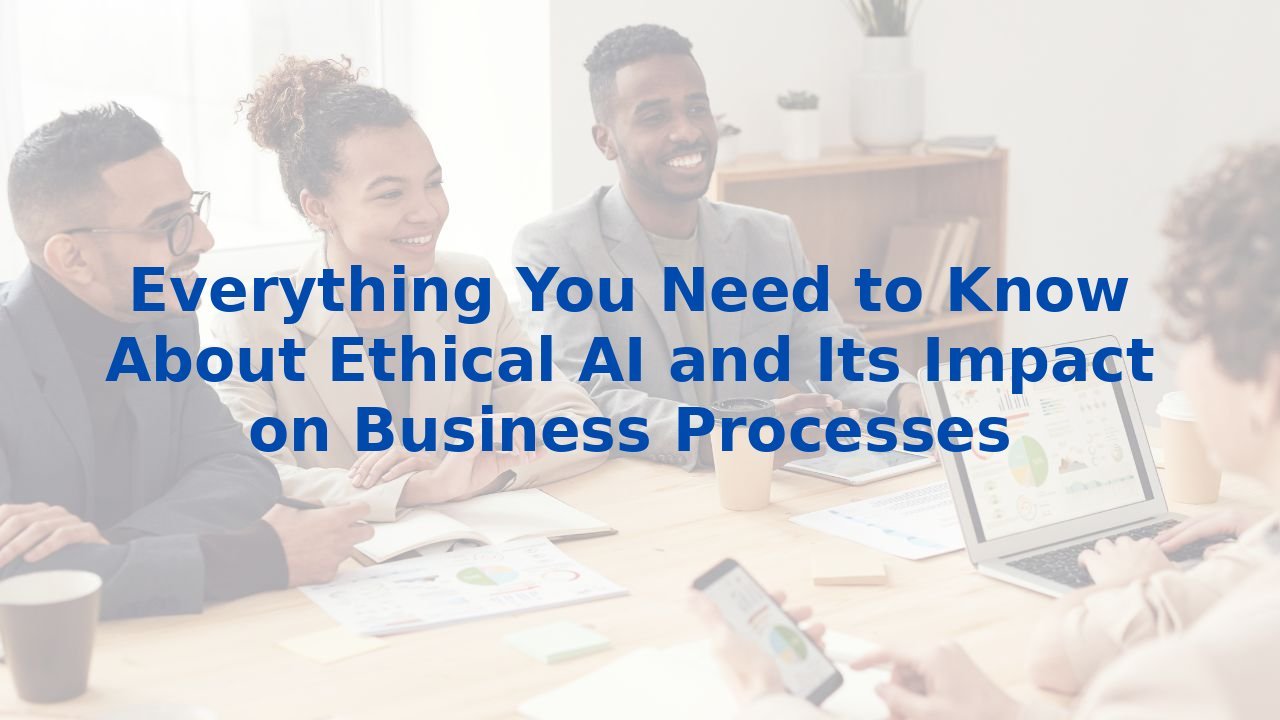Everything You Need to Know About Ethical AI and Its Impact on Business Processes
The Impact of AI on Business Processes: Enhancing Efficiency and Ethical Practices
Introduction
The integration of artificial intelligence (AI) has revolutionized the landscape of modern business, weaving its way into various organizational processes. As companies strive for innovation, understanding the nuances of ethical AI becomes paramount. While AI promises to streamline operations and elevate productivity, it also invites a host of ethical considerations that deserve our attention. In this exploration, we'll dissect how AI can enhance typical business processes, the multiplicity of efficiency benefits it brings, and the critical aspect of training employees for optimum results.
Enhancing Business Processes with AI
AI stands to fortify numerous aspects of business operations, including content creation, customer service, and data analysis. Imagine a world where mundane tasks become automated, freeing human minds to focus on strategic and creative endeavors. AI-generated content is one such arena, enabling the swift creation of marketing materials, blog posts, and social media updates—thus conserving precious time and resources. The shift towards automated content aligns with current business needs, allowing for rapid adaptability to market trends.
Moreover, consider the role of AI-powered chatbots in customer service. Available 24/7, these digital agents offer instant support, handle inquiries, and elevate customer satisfaction significantly. By easing the response burden on human agents, organizations can ensure quicker resolution times while maintaining customer loyalty. The benefits of automation extend beyond the customer-facing domain, reaching into company data analysis capabilities.
Benefits of AI for Improving Efficiency
Integrating AI into business processes yields transformative benefits that can define an organization's trajectory.
- Automated Tasks: AI excels in automating repetitive tasks, allowing human resources to channel their creativity and strategic thinking towards more impactful projects. The result? A marked increase in productivity across departments.
- Data Analysis: The capacity for AI to crunch vast datasets is nothing short of remarkable. By analyzing information rapidly and accurately, organizations can glean invaluable insights that guide decision-making, optimize operations, and unveil new market opportunities.
- Personalization: In a world craving tailored experiences, AI rises to the occasion. By delving into customer data, AI can personalize interactions—boosting engagement and fostering loyalty among clients.
- Predictive Maintenance: AI isn't just reactive; it's proactive. Predicting equipment failures before they occur allows businesses to conduct maintenance with foresight, subsequently minimizing costly downtimes and enhancing operational efficiency.
The Importance of Ethical AI Practices
Despite the myriad benefits, the ascent of AI isn't devoid of ethical implications. Primarily, the originality of AI-generated content comes under scrutiny. Many AI models are trained on existing datasets, which begs the question of originality and opens the door to potential plagiarism. Careful vetting is essential, especially considering the potential for AI to disseminate misinformation.
Ensuring accuracy in AI outputs is not just ethical—it’s crucial for protecting a company’s reputation. Organizations must tread thoughtfully, establishing protocols to assess AI-generated content and maintain the integrity of their messaging.
Benefits of Training Employees for AI
To wield the full potential of AI responsibly, training employees becomes imperative. Here’s why investing in workforce education can be a game-changer:
- Understanding AI Capabilities: Knowledge is power. Employees should grasp the strengths and limitations of AI in order to utilize it effectively and responsibly.
- Ethical Use: Training programs ought to instill the principles of ethical AI usage—touching on crucial aspects such as data ownership, privacy laws, and consistent legal compliance.
- Effective Use of AI Tools: Employees should be adept at constructing meaningful prompts and questioning AI tools to ensure they receive optimal outputs. This includes critical evaluation of AI-generated materials.
- Integration into Business Practices: A seamless integration is vital. Training equips employees to incorporate AI into daily operations smoothly, whether for content creation, data analysis, or customer service commitments.
Conclusion
The pathway to effective business processes in the age of AI lies illuminated with opportunities and challenges alike. Embracing AI's advantages—everything from enhanced efficiency to revitalized customer experiences—can position organizations at the forefront of their industries. However, it is equally critical to navigate the ethical landscape surrounding AI usage to safeguard integrity. By investing in comprehensive employee training programs, organizations can harness the myriad benefits of AI while mastering the balance between innovation and responsibility. This forward-thinking approach not only redefines operational paradigms but also strengthens organizational resilience in an ever-evolving digital environment.



